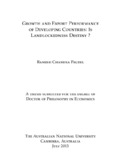Please use this identifier to cite or link to this item:
http://archive.nnl.gov.np:8080/handle/123456789/84| Title: | Growth and export performance of developing countries: is landlockedness destiny? |
| Authors: | Paudel, Ramesh Chandra |
| Keywords: | Landlockedness Landlocked economy -- Nepal Economic growth Export performance |
| Issue Date: | 21-Feb-2018 |
| Abstract: | This thesis investigates determinants of economic growth and export performance of landlocked developing countries (LLDCs). It consists of three research papers enveloped in a stage-setting introductory chapter and a concluding chapter which summarises the key findings and draws policy inferences. The three research papers are written in the form of self-contained essays, but taken together the findings indicate that even though landlockedness hampers a country’s economic growth in many ways, economic policy has the potential to minimise these adverse effects: landlockedness is not destiny. The first paper examines the impact of landlockedness on economic growth using a panel dataset covering 214 countries, including 34 landlocked developing countries, over the period 1980 – 2009. The key focus of the analysis is on the role of openness to foreign trade in determining differences in growth performance between landlocked developing countries as a group and other developing countries, and among landlocked countries themselves. The results indicate that generally landlockedness hampers economic growth, but landlocked countries have the potential to grow faster through greater openness to foreign trade, and through carrying out institutional reforms to improve the quality of governance, which help reducing trade costs. The second paper examines the determinants of export performance of developing countries, with emphasis on the implications of landlockedness, using a panel dataset covering the period from 1995 to 2010. The analysis is conducted within the standard gravity modelling framework. The results indicate that although landlockedness has a significant negative impact on export performance, landlocked countries which have embarked on trade policy reforms perform significantly better than their non-reforming counterparts. There is also evidence that African LLDCs have maintained relatively higher export performance compared to other LLDCs. The third paper is a case study of export performance of a selected landlocked country, Nepal. Following an analytical narrative of export performance over the past three decades against the backdrop of policy reforms and the changing political climate, the paper examines the determinants of export performance within the gravity modelling framework using a product-level (at the three digit level of the Standard International Trade classification) panel dataset covering Nepal’s export to the top 20 trading partners over the period from 1980 to 2010. The analysis distinguishes between Nepalese exports to India and to third country markets, in order to identify a possible ‘big-neighbour’ effect (Gulliver–effect) on export performance of a landlocked country. The results support the hypothesis that exports of highvalue- to-weight products generally grow faster, because trade costs resulting from landlockedness has a fewer adverse effects on these products. Real exchange rate appreciation resulting from the fixed parity of the Nepalese rupee with the Indian rupee adversely affects Nepalese exports to third-country markets. The relatively faster growth of exports to India is partly due to the re-direction of imports by Indian companies via Nepal in order to benefit from significant tariff differences between Nepal and India relating to some products. |
| Description: | A thesis submitted for the degree of Doctor of Philosophy in Economics, The Australian National University, Canberra, Australia, 2013. |
| URI: | http://103.69.125.248:8080/xmlui/handle/123456789/84 |
| Appears in Collections: | 300 Social sciences |
Files in This Item:
| File | Description | Size | Format | |
|---|---|---|---|---|
| Thesis_PhD _ Ramesh Paudel.pdf | 1.97 MB | Adobe PDF |  View/Open |
Items in DSpace are protected by copyright, with all rights reserved, unless otherwise indicated.